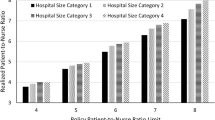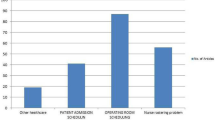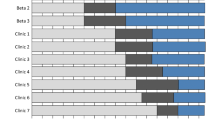Abstract
This study focuses on the master surgical scheduling problem and adds two main contributions. First, it presents a novel mixed integer programming model to support the master surgical schedule production. Second, it uses the model to investigate the impact, in terms of scheduled surgeries, of the flexible management of three critical resources, namely surgical teams, operating rooms and surgical units. Our analysis revealed that to maximise the number of surgeries scheduled, it is sufficient to introduce flexibility with respect to surgical teams and ORs. In fact, if both these resources are managed flexibly, then introducing flexibility with respect to surgical units carries no additional advantages. However, if surgical teams or ORs (or both) are not managed flexibly, then managing surgical units flexibly produces significant benefits. In addition, our study shows that if surgical teams cannot be managed flexibly, then introducing flexibility with respect to ORs yields significant benefits. Similarly, it reveals that if ORs cannot be managed flexibly, then introducing flexibility with respect to surgical teams yields significant benefits as well. The work is based on real data from the Meyer University Children’s Hospital in Florence.



Similar content being viewed by others
References
Agnetis A, Coppi A, Corsini M, Dellino G, Meloni C, Pranzo M (2012) Long term evaluation of operating theater planning policies. Oper Res Health Care 1:95–104
Balasubramanian H, Muriel A, Wang L (2012) The impact of provider flexibility and capacity allocation on the performance of primary care practices. Flex Serv Manuf J 24:422–447
Banditori C, Cappanera P, Visintin F (2013) A combined optimization—simulation approach to the master surgical scheduling problem. IMA J Manag Math 24:155–187
Beliën J, Demeulemeester E (2007) Building cyclic master surgery schedules with leveled resulting bed occupancy. Eur J Oper Res 176:1185–1204
Beliën J, Demeulemeester E, Cardoen B (2009) A decision support system for cyclic master surgery scheduling with multiple objectives. J Sched 12:147–161
Blake JT, Dexter F, Donald J (2002) Operating room managers’ use of integer programming for assigning block time to surgical groups: a case study. Anesth Analg 94:143–148
Buzacott JA, Mandelbaum M (2008) Flexibility in manufacturing and services: achievements, insights and challenges. Flex Serv Manuf J 20:13–58
Cardoen B, Demeulemeester E, Beliën J (2010) Operating room planning and scheduling: a literature review. Eur J Oper Res 201:921–932
Chou MC, Teo C-P, Zheng H (2008) Process flexibility: design, evaluation, and applications. Flex Serv Manuf J 20:59–94
Denton B, Viapiano J, Vogl A (2007) Optimization of surgery sequencing and scheduling decisions under uncertainty. Health Care Manag Sci 10:13–24
Field A (2005) Discovering statistics using SPSS. SAGE Publications, London
Glouberman S, Mintzberg H (2001) Managing the care of health and the cure of disease-part I: differentiation. Health Care Manag Rev 26:56–69
Guerriero F, Guido R (2011) Operational research in the management of the operating theatre: a survey. Health Care Manag Rev 14:89–114
Gupta D, Shanthikumar G (2008) Editorial. Flex Serv Manuf J 20:1–10
Hans E, Wullink G, van Houdenhoven M, Kazemier G (2008) Robust surgery loading. Eur J Oper Res 185:1038–1050
Litvak E, Long MC (2000) Cost and quality under managed care: irreconcilable differences. Am J Manag Care 6:305–312
May JH, Spangler WE, Strum DP, Vargas LG (2011) The surgical scheduling problem: current research and future opportunities. Prod Oper Manag 20:392–405
Montgomery DC, Runger GC (2003) Applied statistics and probability for engineers. Wiley, New York
Santibáñez P, Begen M, Atkins D (2007) Surgical block scheduling in a system of hospitals: an application to resource and wait list management in a British Columbia health authority. Health Care Manag Sci 10:269–282
Stuart K, Kozan E (2012) Reactive scheduling model for the operating theatre. Flex Serv Manuf J 24:400–421
Tànfani E, Testi A (2010) A pre-assignment heuristic algorithm for the master surgical schedule problem (MSSP). Ann Oper Res 178:105–119
van Oostrum JM, van Houdenhoven M, Hurink J, Hans E, Wullink G, Kazemier G (2008) A master surgical scheduling approach for cyclic scheduling in operating room departments. OR Spectr 30:355–374
van Oostrum JM, Bredenhoff E, Hans EW (2010) Suitability and managerial implications of a master surgical scheduling approach. Ann Oper Res 178:91–104
Vincent C, Taylor-Adams S, Stanhope N (1998) Framework for analysing risk and safety in clinical medicine. BMJ Br Med J 316:1154
Vissers J, Adan I, Bekkers J (2005) Patient mix optimization in tactical cardiothoracic surgery planning: a case study. IMA J Manag Math 16:281–304
Acknowledgments
The authors are grateful to Meyer University Children’s Hospital, and in particular to General Director Dr. Tommaso Langiano, and to the Medical Director Dr. Monica Frassineti for supporting the research project that has inspired this study. The authors would also express their sincere gratitude to the anonymous referees for their insightful critical comments and suggestions.
Author information
Authors and Affiliations
Corresponding author
Rights and permissions
About this article
Cite this article
Visintin, F., Cappanera, P. & Banditori, C. Evaluating the impact of flexible practices on the master surgical scheduling process: an empirical analysis. Flex Serv Manuf J 28, 182–205 (2016). https://doi.org/10.1007/s10696-014-9208-9
Published:
Issue Date:
DOI: https://doi.org/10.1007/s10696-014-9208-9




